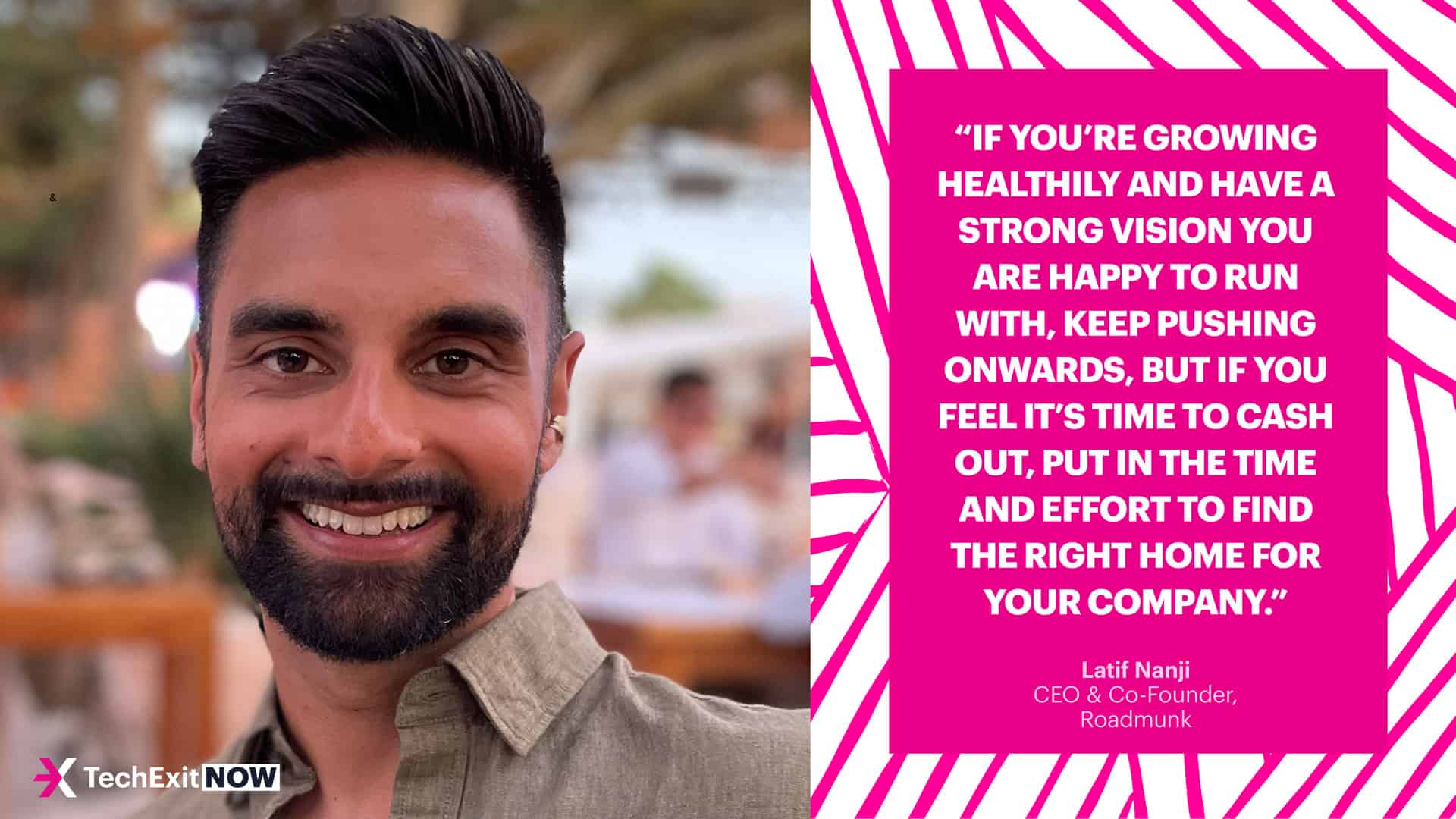Why Latif Nanji Sold Roadmunk Despite Huge Growth Potential
Stefan Palios

Key takeaways:
- When choosing whether to fundraise or exit, look at growth potential, market velocity, and personal values at the time.
- If you ultimately decide to exit, prioritize acquirers who understand and align with your vision for the company.
When Roadmunk sold to Tempo.io in November 2021, it was another celebrated exit in a thriving Canadian tech market. Before the sale, though, founder Latif Nanji wasn’t sure he even wanted to sell the company.
Speaking with TechExit.io ahead of his conference talk in the Toronto Edition on October 19th, 2022, Latif explained the three factors that led to him selling the business he founded nearly a decade earlier.
Why an exit made sense
1. Assessing growth potential
Roadmunk was predominantly bootstrapped, which kept the company lean and nimble but presented growth challenges. Inside the business, Latif acknowledged that customer demands were outpacing product development capabilities.
However, Roadmunk had a very happy—and growing—customer base. So Latif wasn’t worried about the company’s viability, simply that growth would require a lot of resources to scale up into a full enterprise suite of features.
2. Market velocity
As Latif scanned the market, he saw what everyone noticed in 2020 and early 2021: an already-fast growing market hit a new inflection point of growth. Software and digital adoption was growing at unprecedented rates and, as a result, valuations were high across the market.
While Latif felt Roadmunk had the opportunity to grow to that level, it would need resources quickly. That’s when it became clear the decision was either raise or exit to a company with additional resources to leverage.
3. Personal values
After looking at the market and growth potential of the company, there were two things that Latif valued that led him down the path of acquisition.
The first was the transition to remote-first due to the pandemic. It remained unclear for how long and how likely a full transition back to the office would take and how enjoyable it would be to work with a team behind a Zoom screen in the meantime. Despite seeing some productivity benefits on the team, Latif realized he doesn’t like remote work. He enjoys travelling but still craves face-to-face collaboration or brainstorming and feels it just can’t be replicated virtually.
“I just wasn’t thrilled about remote work,” said Latif.
The second was about his life stage. When pondering growth versus an exit, Latif realized he was coming to the end of a 10-year plan he set for himself. When he started Roadmunk he mentally charted a 10-year journey, with 2021 being year eight.
Put your baby in the right hands
With both market velocity and his personal direction changing, exiting became the right choice for Latif and Roadmunk. He recognized he wanted to see Roadmunk find a home that could continue to serve and build out what customers needed, and he had to be strategic about his choice.
But before he could go on a roadshow to find a buyer, the private equity firm that holds a majority stake in Tempo.io reached out to him. Immediately, Latif was impressed that the Chief Product Officer of Tempo.io joined the exploratory call, linking to his desire to sell to a company that wanted to continue the product vision.
“It was important to not sell just for the transactional nature of it,” said Latif. “I wanted someone who cared about the vision. I wanted to put my baby, so to speak, in the right person’s hands.”
After jamming out on product vision and continuing conversations about valuation and terms, Latif agreed to sell Roadmunk to Tempo.io, a deal that closed in November 2021.
Latif ultimately stepped away from the company after helping the transition from November 2021 to May 2022. Now he’s a free agent with a new set of priorities: improving his health, spending time with friends and family, traveling, and angel investing.
Looking back on the ultimate decision, Latif doesn’t regret it. But he cautions founders to assess whether growth or selling is the right move. In both cases, though, Latif wants founders to be selfish—think about what they want for the business and themselves.
Latif said many founders think about exiting because of the financial upside, which makes sense—they want to transition some of their equity wealth into cash wealth they can use for other purposes. But there’s more than one way to do this, such as a secondary round or partial exit, that keeps you building a business you are passionate about. If you’re truly ready to move on though, you should consider an exit as it's harder for non-founders on average to reach the same scale.
“If you’re growing healthily and have a strong vision you are happy to run with, keep pushing onwards,” said Latif. “But if you feel it’s time to cash out, put in the time and effort to find the right home for your company .”
BACK












